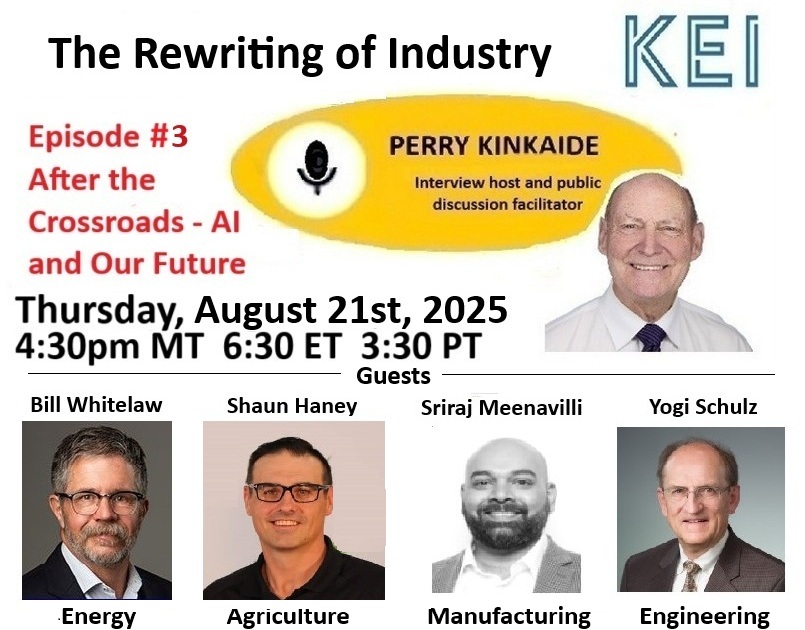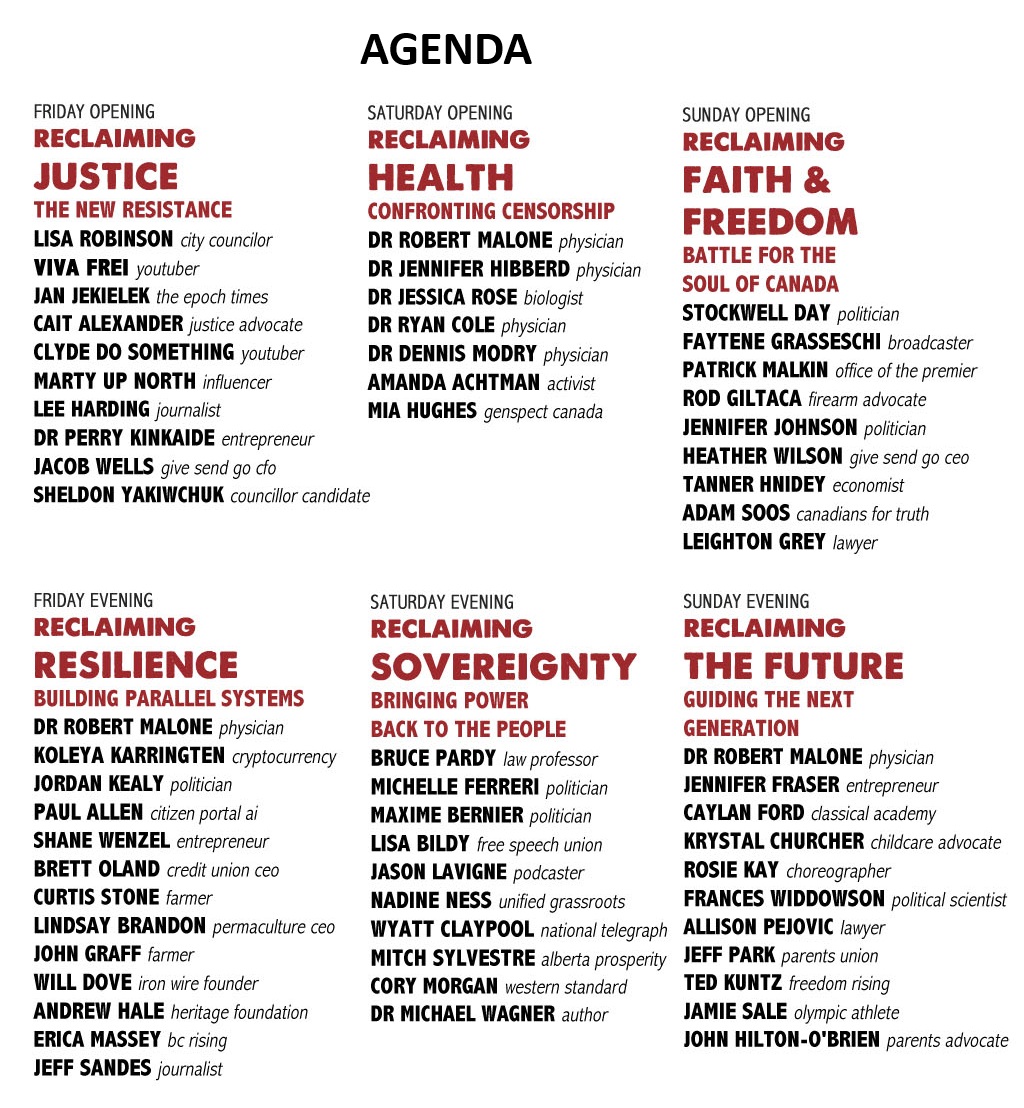|
AI and OUR Future: The Rewriting of Industry |
DIRECTORY | ||
|
Contributions: |
Action: Help sustain KEI's contributions |
Fact or Fiction?
USA - in Decline HERE |
|
|
Editor - Perry Kinkaide |
Artificial Intelligence is moving well beyond the confines of Silicon Valley, quietly—but profoundly—reshaping the very industries that sustain our daily lives: energy, agriculture, manufacturing, and transportation. This edition of the KEI Network newsletter and associated webinar, explore how AI is not only making these sectors more efficient, but also redefining what productivity, sustainability, and competitiveness mean in the 21st century. Early AI adoption has been about optimization—fewer breakdowns, better resource use, faster production. But as the leaders we spoke with caution, |
||
|
cost-cutting alone has limits. True growth lies in re-imagining business models, creating new products, and capturing untapped markets. The shifts are also transforming the role of engineers, demanding training that integrates advanced data skills, systems thinking, and ethical awareness alongside traditional technical expertise. This week's Fact or Fiction feature - see above, explores the claim that the USA is in decline including reference to the President's distracting leadership style. - Editor |
|||
|
AI in Industry: Beyond Efficiency Toward Sustainable Growth Artificial intelligence is no longer a niche technology for tech companies—it is rapidly reshaping the foundational industries that power our economies: energy, agriculture, manufacturing, and transportation. From precision farming to predictive maintenance in energy grids, to just how cars are made, and transforming how we power, produce, and transport. It is demanding not only new tools but entirely new thinking.
Industry leaders in energy, agriculture, manufacturing, and engineering agree that the technology’s potential extends well beyond automating existing processes. While many early deployments of AI have focused on efficiency gains and cost savings, this is not, by itself, a sustainable pathway to growth. The real opportunity lies in AI’s ability to create new value, new products, and new markets.
The Efficiency Plateau. The first wave of industrial AI adoption has largely been about optimization—reducing downtime, cutting energy use, and streamlining supply chains.
These applications deliver measurable savings, but there is a ceiling: you can only cut costs to zero. Without strategies that use AI to grow revenue, organizations risk hitting an “efficiency plateau,” where gains flatten and competitiveness stalls. Continued below
No need to register. Just ZOOM in: https://us02web.zoom.us/j/84258596166?pw.. Bill Whitelaw - Executive Director of Rextag, providing comprehensive energy infrastructure data across North America and globally, offering GIS mapping, dataset subscriptions, and visualization tools for the full energy supply chain. He is widely recognized for his work advancing conversations around the energy transition, sustainability, and innovation, and serves on advisory boards including the Energy Futures Lab and the Clean Resource Innovation Network. Bill chairs the Canadian Society for Evolving Energy and holds director roles with organizations such as the Ten Peaks Innovation Alliance, the Petroleum History Society, and Agriculture for Life. Previously, he led JuneWarren-Nickle’s Energy Group, served as CEO of Glacier Resource Innovation Group, and was Executive Vice-President, Business Information at Glacier Media. A frequent speaker, moderator, and commentator, he brings decades of leadership in energy media and policy dialogue, supported by studies at Loyalist College, Queen’s University, and the University of Calgary.
Shaun Haney - founder of RealAgriculture, one of North America’s leading agricultural media platforms, serving farmers and ranchers with timely, trusted insights on ag policy, agronomy, current events, and farm management. Through a combination of digital content, radio, and podcasts, RealAgriculture reaches a broad audience across the ag sector. Shaun hosts RealAg Radio, broadcast daily across North America on SiriusXM’s Rural Radio Channel 147, as well as RealAg on the Weekend, heard across Saskatchewan on Rawlco Radio and in Alberta on the Corus Entertainment Network. A recognized voice in North American agriculture, Shaun is a frequent contributor to RFD-TV, Agritalk, and US Farm Report. In 2019, Shaun partnered with Justin Funk of Agri Studies to launch RealAgristudies, a market insights and research initiative focused on better understanding the attitudes and behaviors of Canadian farmers.
Sriraj Meenavilli - Product Manager at NTWIST, where he leads the development of AI and optimization solutions for intelligent manufacturing, with applications ranging from advanced scheduling to real-time operational improvements. He holds a Master’s degree in Computer Science from Simon Fraser University, where his research focused on leveraging neural networks and the Koopman operator for controlled dynamical systems and model predictive control. With a background in industrial systems engineering and applied machine learning, Sriraj has designed and deployed AI systems across diverse sectors, and is an active contributor to the AI4Manufacturing community. He has presented on topics such as “Beyond Scheduling: A Comprehensive Solution for Intelligent Manufacturing Optimization,” sharing his expertise at the intersection of AI research and industrial innovation.
Yogi Schulz - Partner at Corvelle Consulting in Calgary, has over four decades of experience delivering IT solutions across the petroleum industry and other sectors. He specializes in selecting and implementing enterprise systems for finance, production revenue accounting, land and contracts, and geotechnical operations, often guiding organizations through mergers, regulatory changes, and technology adoption. Yogi played a key role in developing the Enhanced Production Audit Program (EPAP) for the Alberta Energy Regulator and continues to advise operators on its effective use. A frequent columnist for ITWorldCanada.com and Engineering.com, he holds a B.Comm. from the University of Calgary and the ISP designation. Continued from above Where Profitability Potential is Highest. The greatest returns from AI in industry come when it is used not only to optimize existing operations but to enable new business models, products, and services. Examples include:
Three Impacts Reshaping Industry
The Strategic Imperative. The lesson for industry is clear: AI must be treated as a growth engine, not just a cost-cutting tool. That means pairing automation with innovation—using AI to develop new capabilities, open untapped markets, and create entirely new categories of products and services. As one industry leader put it during a recent cross-sector session: “If all we do is make the old model cheaper, we’re not preparing for the future—we’re just making the past last a little longer.”
For more and to register visit WeUnify.ca
|







